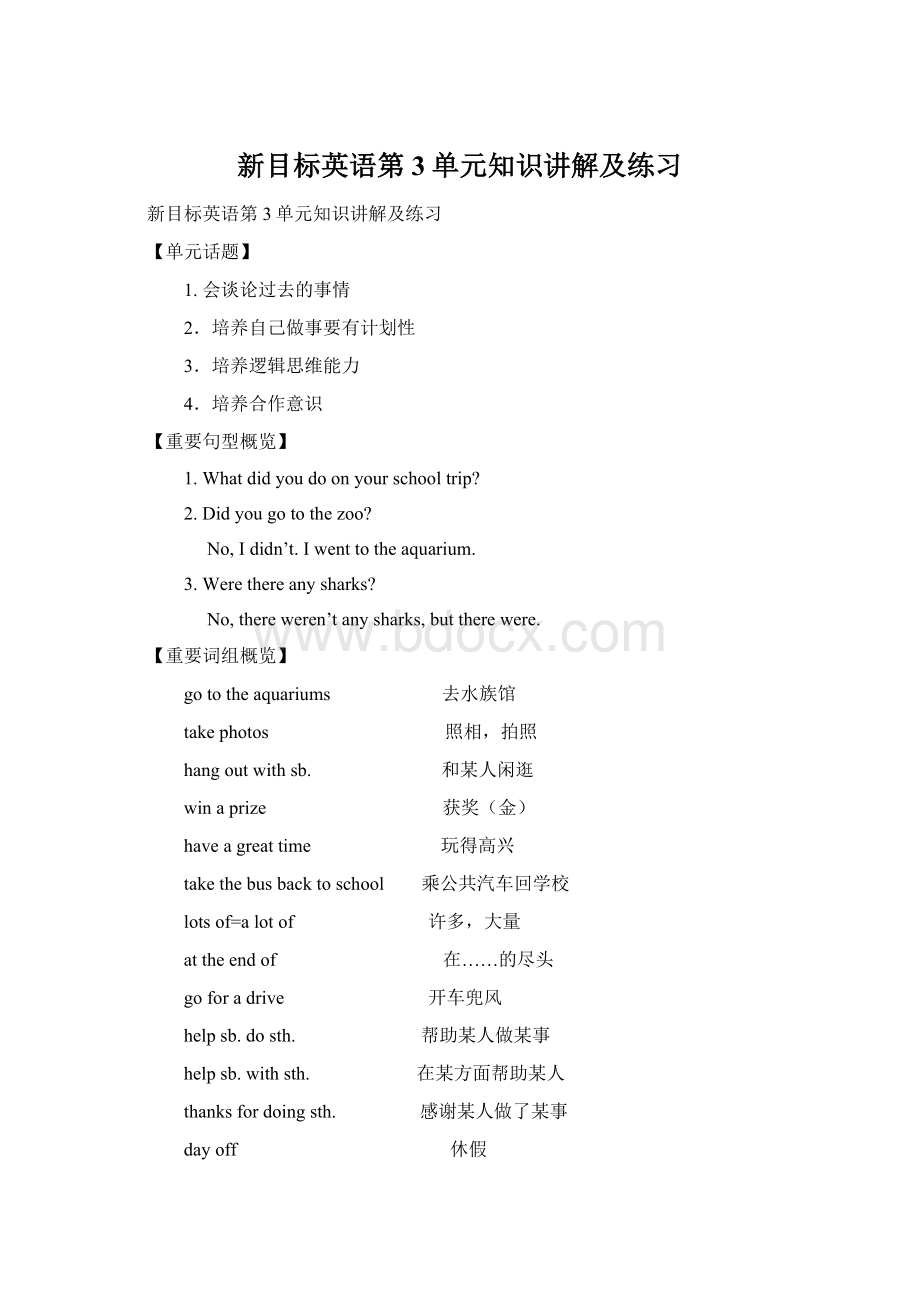新目标英语第3单元知识讲解及练习.docx
《新目标英语第3单元知识讲解及练习.docx》由会员分享,可在线阅读,更多相关《新目标英语第3单元知识讲解及练习.docx(51页珍藏版)》请在冰豆网上搜索。

新目标英语第3单元知识讲解及练习
新目标英语第3单元知识讲解及练习
【单元话题】
1.会谈论过去的事情
2.培养自己做事要有计划性
3.培养逻辑思维能力
4.培养合作意识
【重要句型概览】
1.Whatdidyoudoonyourschooltrip?
2.Didyougotothezoo?
No,Ididn’t.Iwenttotheaquarium.
3.Werethereanysharks?
No,thereweren’tanysharks,buttherewere.
【重要词组概览】
gototheaquariums 去水族馆
takephotos 照相,拍照
hangoutwithsb. 和某人闲逛
winaprize 获奖(金)
haveagreattime 玩得高兴
takethebusbacktoschool 乘公共汽车回学校
lotsof=alotof 许多,大量
attheendof 在……的尽头
goforadrive 开车兜风
helpsb.dosth. 帮助某人做某事
helpsb.withsth. 在某方面帮助某人
thanksfordoingsth. 感谢某人做了某事
dayoff 休假
【语法知识聚焦】
一般过去时:
表示过去曾经发生的动作或出现的状态,以动词的过去式表达,如:
Iwasatthelibraryyesterdayafternoon.
Tomstudiedhardanddidwellinthefinalexamlastyear.
动词的过去式分为规则动词和不规则动词两种。
1.规则动词只要在动词词尾加上ed即可。
具体方法是一般情况直接加,如:
clean—cleaned;
2.词尾是不发音字母e的,可只加上d,如:
like—liked;
3.词尾为重读闭音节,结尾只有一个辅音字母的,应双写该辅音字母,再加上ed,如:
stop—stopped;
4.词尾为辅音字母加y的,应将y改为i再加上ed,如:
studystudie
5.不规则动词有其自己的变化形式,只能分别记忆。
其否定句由助动词did加上not构成;疑问句应在主语前加上助动词did,并将原谓语动词变为原形,如:
Wedidnotgotothecinemayesterday.
Didyouhaveagoodtimeduringthesummerholiday?
Whendidyougettoschoolthismorning?
一般过去时的时间状语都是明显表示过去的,如:
yesterday、lastnight、lastweek、in1998、threemonthsago等。
【语法练习】
用括号中所给动词的正确形式填空
1.Tommy,youmustn’t_____thatword.That’snotaniceword.
A.said B.say C.saying D.says
2.Let’s_____theclassroomtogether.
A.clean B.cleaning C.cleaned D.toclean
3.Shallwe_____somebooksatthebookfair?
A.tobuy B.bought C.buy D.buying
4.Youmay_____MrZhanginhisoffice.
A.finds B.find C.finding D.found
5.Mike_____toschoolthismorning.
A.walks B.walk C.walking D.walked
6.MrsBlackisinthekitchen.She______dinnerforherfamily.
A.prepares B.prepares C.preparing D.ispreparing
7.Theboyisstandingatthecorner.He______(wait)forthebus.
He____(wait)forthebusforhalfanhour.
A.waiting,waiting B.iswaiting,waited
C.iswaiting,haswaited D.waits,haswaited
8.There______atalkaboutbiologyinourschoolnextMonday.
A.willhas B.willhave C.willbe D.wouldbe
9.Myuncle_____mathsinthatschooltwoyearsago.
A.teaches B.teach C.taught D.hastaught
10.We_____totheSummerPalaceifitisfinethisSunday.
A.went B.go C.going D.willgo
11.Iwilltellhimthenewsassoonashe_____back.
A.comes B.come C.came D.willcome
12.Gina______toapartylastnight.
A.go B.togo C.going D.went
【Cloze】
用括号中所给动词的正确形式填空。
Myfriend,Roy, 1 (die)lastyear.He 2 (leave)mehisCDplayerandhiscollectionofCDs.Roy 3 (spend)alotofmoneyonCDs.He 4 (buy)oneortwonewCDseveryweek.Henever 5 (go)tothecinemaortothetheatre.He 6 (stay)athomeeveryeveningand
7 (listen)tomusic.Heoften 8 (lend)CDstohisfriends.Sometimesthey 9 (keep)them.He 10 (lose)manyCDsinthisway.
【阅读理解】
Oneafternoon,Kateandherbrother,Bob,wentouttoplay.Katewaseight,andBobwasten.“Let’sgotothebridgeandwecanseefishintheriver.”saidKate.
“Idon’tknow…”Bobsaid.“Mumtoldus,‘Don’tgoonthebridge.’Shesaidit’sdangerous.”
Katesaid,“Iamnotafraid.Areyou?
”
Theywalkedontothebridgeandbeganlookingforfishintheriver.Thebridgewasatrainbridge.Trainswentoverthebridgethreetimesaday.
Thechildrenwerestandinginthemiddleofthebridgewhentheyheardaloudnoise.“Atrainiscoming!
”Bobshouted.“Run!
”Herantotheendofthebridge.Hewassafe.
Kateran,too,butshefell.Thetrainwascomingfast.KaterantowardsBob.Shefellagainrightonthetraintracks(铁轨).Therewasnotimetoleave.Shehadtoliedownbetweenthetracks.Afewsecondslater,thetrainwentoverthegirl,butshewasnothurtatall.ShestoodupandsaidtoBob,“Don’ttellMum!
Don’ttellMum!
”
Atlasttheirmotherfoundoutaboutthestory.Shewasangrybecausetheywentonthebridge.ButshewashappythatKatewasallright.
( )1.BobandKatewere______.
A.twins B.brothers C.sisters D.brotherandsister
( )2.Oneafternoontheywenttothebridgetosee_____.
A.theirmother B.fish C.thetrain D.theriver
( )3.Whenthetraincame,thechildrenwere_____.
A.inthemiddleofthebridge B.attheendofthebridge
C.ontheirwaytothe bridge D.awayfromthebridge
( )4.WherewasKatewhenthetrainwasgoingoverher?
A.Shefellagainrightonthetraintracks(铁轨). B.KaterantowardsBob.
C.Shehadtoliedownbetweenthetracks. D.Shestoodupandcried.
( )5.Whentheirmotherknewaboutthestory,shewas_____.
A.happy B.angry C.sorry D.bothangryandhappy
【书面表达】
上个星期六学生们去西山进行了一次野餐,请参考所给词语,描述此次活动.
gotoWestHill,bybike,ashortrest,after,thefootof,sing,dance,climb,see,hear,
happy
参考答案:
【语法练习】
1-5BACBD 6-10.DCCCD 11-12.AD
1.情态动词mustn’t应该与动词原形连用,因此答案为B.
2.Let’s=Letus,动词let应该接动词原形,做宾语补足语,letsb.dosth,因此答案为A.
3.情态动词shall应该与动词原形连用,因此答案为C.
4.情态动词may应该与动词原形连用,因此答案为B.
5.根据时间状语thismorning,可知本题为一般过去时,因此答案为D.
6.由“MrsBlackisinthekitchen.”可知本题为现在进行时因此答案为D.
7.根据题中的“Theboyisstandingatthecorner.”可知第一个空的答案为现在进行时,又根据
“forhalfanhour”,得第二空答案为现在完成时,因为现在完成时经常用来表示动作延续一段时
间,因此本题答案为C.
8.根据时间状语判断,本题为一般将来时,在therebe句型中,应为:
therewillbe,所以答案为C.
9.根据时间状语,本题为一般过去时,答案为C.
10.由if引导的条件状语从句,主句通常用一般将来时,因此答案为D.
11.由assoonas引导的时间状语从句,主句用一般将来时,从句通常用一般现在时代替一般将来时,因此
答案为A.
【Cloze】
1.died 2.left 3.spent 4.bought 5.went
6.stayed 7.listened 8.lent 9.kept 10.lost
【阅读理解】
1.D 2.B 3.A 4.C 5.D
1.根据原文“KateandherbrotherBobwentouttoplay”部分,答案为D.
2.根据原文“andwecanseefishintheriver”,因此,答案为B
3.根据原文“Thechildrenwerestandinginthemiddleofthebridge”部分以及接着一句
“Atrainiscoming”,答案为A.
4.根据原文“Shehadtoliedownbetweenthetracks”部分,答案为C.
5.根据原文“Shewasangrybecausetheywentonthebridge.ButshewashappythatKatewas
allright.”部分---妈妈即生气又高兴,答案应该为D.
【书面表达】
OutclasshadapicniclastSaturday.WewenttoWestHillbybike.WehadashortrestafterwegottothefootofWestHill.Firstwehadourpicniclunch.Afterlunchwesanganddancehappily.Thenwebegantoclimbthehill.Wesawmanybeautifulflowers,heardthebirdssingingandgotalotofwildfruits.Wehadawonderfultime.
IfeltverytiredwhenIgothome,butIwasveryhappy.
重点难点
过去式的构成
(1)行为动词过去式的变化规则:
词尾-ed的读音:
(2)不规则动词过去式有其特殊形式。
如:
have/has—had do/does—did go—went come—came get—got
forget—forgot buy—bought read—read know—knew
find—found meet—met fly—flew
单词解析
1.peel/pi:
l/
v.除掉(水果等)的皮:
peelanapple削苹果皮
n.(蔬菜、水果等的)皮:
lemonpeel柠檬皮
2.pour/pɔ:
,pɔː(r)/
v.①倒,注,灌;②流出,倾泻:
ThisriverpoursintothePacific.这条河流入太平洋。
③(雨等)倾盆而下
【考点】poursth.forsb.给某人倒某物:
ShallIpouryouacupoftea?
我给你倒一杯茶好吗?
pourcoldwateronsb.给某人泼冷水,使扫兴;pourin涌入,倒进:
Reportsofnewsuccesseskeeppouringin.捷报频频传出。
pourout大量涌出,倾泻出来;将某事物尽情表达出来:
Whenherealizedweknewthetruth,thewholestorycamepouringout.他意识到我们已了解了真相,便把事情的原委和盘托出。
3.put/put/
v.放:
Didyouputmilkinmytea?
你在我的茶中加奶了吗?
4.need/ni:
d/
v.需要:
Youdon'tneedtogotoschoolifyoufeelsick.如果你不舒服,就不必去上学了。
n.需要:
Thereisnoneedforyoutowait.你不必等了。
5.blender/ˈblendə/
n.搅拌器;混合物
6.milk/milk/
n.[U.]乳,奶
【考点】aglassofmilk一杯奶;befedonmother'smilk以母乳为食
【引申】It'snousecryingoverspoiltmilk.覆水难收。
milkshake奶昔;milkpowder奶粉
7.yogurt/ˈjəʊgət/
n.酸乳酪;酸母乳;酸奶
8.watermelon/ˈwɔ:
təˌmelən,ˈwɔtə-,ˈwɔ:
tərˌmelən/
n.西瓜
9.cinnamon/ˈsinəmən/
n.肉桂(色)
adj.肉桂色的
10.honey/ˈhʌni/
n.蜂蜜,甜蜜;甜美
v.说亲切话
11.cup/kʌp/
n.杯子
【引申】cupboard器皿柜;glass玻璃杯;mug马克杯
12.tablespoon/ˈteɪbəlˌspu:
n/
n.①餐匙;②一餐匙的量:
addtwotablespoonsofflour加两餐匙的面粉
13.popcorn/ˈpɔpkɔ:
n/
n.(热爆的)玉米花
14.sandwich/ˈsænwidʒ/
n.三明治
【考点】注意字母d不发音。
15.mayonnaise/ˌmeɪəˈneɪz,ˈmeɪəˌneɪz/
n.橄榄油;柠檬汁混制的蛋黄酱
16.onion/ˈʌnjən/
n.洋葱
17.lettuce/ˈletis/
n.(植物)莴苣;莴苣叶
18.tomato/təˈmɑ:
təu/
n.西红柿,蕃茄
【考点】(pl.)tomatoes
19.relish/ˈreliʃ/
n.调味品;美味
20.turkey/ˈtə:
ki/
n.火鸡(肉)
21.first/fə:
st/
adj.& adv.第一,最初,最先
n.最初,当初
【考点】atfirstsight一见之下,乍看来:
Atfirstsighttheproblemseemedeasy.这问题乍看起来很容易。
firstofall首先,第一:
Firstofall,Imustcheckthenumber.首先我必须检查那号码。
fromfirsttolast从头到尾。
atfirst起初,开始时。
【引申】近义词:
earliest,highest,leading;反义词:
final,last。
TheFirstLady总统夫人; firstname名字(与姓相对);first-aid急救的;firstcost(商)最初成本。
22.then/ðen/
adv.①当时,那时:
Iwaslivingathomethen.我当时在家住。
②然后,后来,接着:
Idroppedinatherhouseandthenwenthome.我顺便到她家探访一下,然后回家了。
③那么:
Whatdoyouthinkofthat,then?
那么你怎么看待这件事?
【考点】sincethen自那以来:
I'veneverseenhimsincethen.自那时起,我就再没见过他。
fromthenon从那时起:
Hehasbeenteachinginthisschoolfromthenon.从那时起,他就在这所学校教书。
nowandthen不时地:
Shecametoseehimnowandthen.她经常去看他。
23.next/nekst/
adj.(无比较级或最高级)最近的;紧挨的;隔壁的:
Don'tworry,wecantakethenextbus.别着急,我们可以搭下一班车。
adv.随后,下一步:
Whatshouldwedonext?
我们接下来应该怎么做?
【记忆法】next,text(课文)联合记忆。
【考点】next没有比较级或最高级。
nextdoor在隔壁:
Helivesnextdoor.他住在隔壁。
【引申】nexttononeadj.不比任何人差的;nexttime下一次。
24.finally/ˈfainəli/
adv.最后;总之:
Finally,Iwouldliketosay…最后,我想说……
词语辨析
1.some与any
some和any都是不定代词,可以用来代替名词或形容词。
(1)some的基本意思是“一些”,“有些”,常用在肯定句中作主语、宾语或定语等。
作定语时,它所修饰的名词可以是可数名词,也可以是不可数名词。
如:
Hewantssomewater.他想要一些水。
Idon'tlikeit,butsomedo.我不喜欢它,但有些人喜欢。
(2)any的意思是“什么”,“一些”,“任何”,常用在否定句和疑问句中